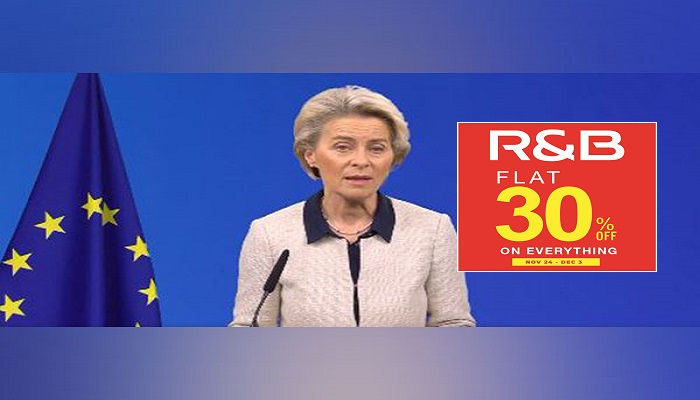
Brussels: The European Union has reached a deal for a $60 per barrel price cap on Russian seaborne oil, with an aim to diminish Russia's revenues.
Taking to Twitter, the president of the European Commission, Ursula von der Leyen said, "The EU agreement on an oil price cap, coordinated with G7 and others, will reduce Russia's revenues significantly. It will help us stabilise global energy prices, benefitting emerging economies around the world." Leyen also shared the video on her Twitter account in which she said, "As you know the EU and other major G7 partners will have a full import ban on Russian seaborne oil as of December 5. But we need to ensure that emerging and developing countries continue to have access to some Russian crude oil at limited prices and thus, today the EU the G7 and other global partners have agreed to introduce a global price cap on seaborne oil from Russia."
Talking about the objectives, the European Commission president said that firstly, it will strengthen the effect of our sanctions, secondly, it will diminish Russia's revenues and thirdly, at the same time, it will stabilise global energy markets because it will allow some Russian seaborne oil to be traded, brokered, transported by EU operators to third countries, as long as it is solid below the cap.
"So this price cap will benefit directly emerging and developing economies, and it will be adjustable over time so that we can react to market developments. Together with our partners, we stand united and firm in our opposition to Russia's atrocious war," she added.
According to CNN, the West's biggest economies agreed earlier this year to establish a price cap after lobbying by the United States and vowed to hash out the details by early December. But setting a number had proved difficult.
Capping the price of Russian oil between USD 65 and USD 70 a barrel, a range previously under discussion, wouldn't have caused much pain for the Kremlin. Urals crude, Russia's benchmark, has already been trading within or close to that range. EU countries such as Poland and Estonia had pushed for the cap to be lower.
"Today's oil price cap agreement is a step in right direction, but this is not enough," Estonian foreign minister Urmas Reinsalu tweeted Friday. "Intent is right, delivery is weak."
A price of USD 60 represents a discount of almost USD 27 to Brent crude, the global benchmark. Urals has been trading at discounts of around USD 23 in recent days, CNN reported.
The risk of settling on a lower price is that Russia could retaliate by slashing its output, which would roil markets. Russia previously warned that it will stop supplying countries that adhere to the cap.